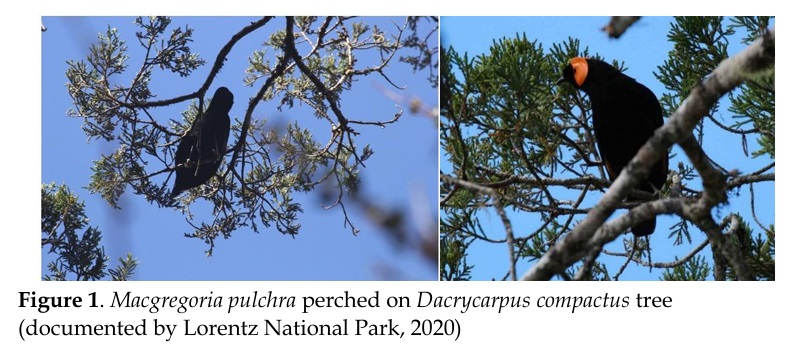Trans Papuan Highway Construction and Honey Eater Bird (Macgregoria pulchra) Population
DOI:
https://doi.org/10.22219/avicennia.v6i2.29631Keywords:
Dacryocarpus compactus, Isap Madu Elok, Lorentz National Park, sustainabilityAbstract
Lorentz National Park has a high degree of endemism; however, it is vulnerable to extinction. One of the most attractive birds is MacGregor’s Giant Honeyeater (Isap Madu Elok, Indonesian Language) that nested on the Dacryocarpus compactus tree. However, either the birds or the trees has very little information. On the other hand, they are impacted by the massive local development. Trans Papuan Highway Project crossing the Lorentz National Park area threat to the sustainability of habitat and population of that bird. This mini review highlights several impacts of road construction on the population of Isap Madu Elok bird in LNP: the habitat fragmentation; the potentially increasing human disturbance due to open access; and lastly the mitigation strategy for minimizing the impact.
Downloads
References
Andersen, M. J., McCullough, J. M., Friedman, N. R., Peterson, A. T., Moyle, R. G., Joseph, L., & Nyári, Á. S. (2019). Ultraconserved elements resolve genus-level relationships in a major Australasian bird radiation (Aves: Meliphagidae). Emu - Austral Ornithology, 119(3), 218–232. https://doi.org/10.1080/01584197.2019.1595662
Arima, E. Y., Walker, R. T., Perz, S. G., & Caldas, M. (2005). Loggers and Forest Fragmentation: Behavioral Models of Road Building in the Amazon Basin. Annals of the Association of American Geographers, 95(3), 525–541. https://doi.org/10.1111/j.1467-8306.2005.00473.x
Bekker, H., & Iuell, B. (2003). Habitat fragmentation due to infrastructure. Proceedings of the 2003 International Conference on Ecology and Transportation, 1–14. https://escholarship.org/uc/item/9693w540
Clench, M. H. (1992). Pterylography of Birds-of-Paradise and the Systematic Position of Macgregor’s Bird-of-Paradise (Macgregoria pulchra). The Auk, 109(4), 923–928. https://doi.org/10.2307/4088177
Cracraft, J., & Feinstein, J. (2000). What is not a bird of paradise? Molecular and morphological evidence places Macgregoria in the Meliphagidae and the Cnemophilinae near the base of the corvoid tree. Proceedings of the Royal Society of London. Series B: Biological Sciences, 267(1440), 233–241. https://doi.org/10.1098/rspb.2000.0992
Crates, R., Rayner, L., Stojanovic, D., Webb, M., Terauds, A., & Heinsohn, R. (2018). Contemporary breeding biology of critically endangered Regent Honeyeaters: implications for conservation. Ibis, 161(3), 521–532. https://doi.org/10.1111/ibi.12659
Druce, S. C. (2020). Political Impasse vs Economic Development: A History and Analysis of the West Papua Conflict in Indonesia. In M. Oishi (Ed.), Managing Conflicts in a Globalizing ASEAN. Springer Singapore. https://doi.org/https://doi.org/10.1007/978-981-32-9570-4_5
Frith, C. B. (2020). The New Guinea bird names Macgregor’s Bowerbird and Macgregor’s Honeyeater. Bulletin of the British Ornithologists’ Club, 140(2), 214. https://doi.org/10.25226/bboc.v140i2.2020.a12
Heinsohn, R., Lacy, R., Elphinstone, A., Ingwersen, D., Pitcher, B. J., Roderick, M., Schmelitschek, E., Van Sluys, M., Stojanovic, D., Tripovich, J., & Crates, R. (2022). Population viability in data deficient nomadic species: What it will take to save regent honeyeaters from extinction. Biological Conservation, 266, 109430. https://doi.org/10.1016/j.biocon.2021.109430
IUCN. (2020). Lorentz National Park. IUCN World Heritage Outlook. https://worldheritageoutlook.iucn.org/explore-sites/wdpaid/198298
Kambu, Z., Jinca, M. Y., Pallu, M. S., & Ramli, M. I. (2022a). Meta Synthesis of Community Participation Model on Trans-Papua Road Development. Civil Engineering Journal (Iran), 8(11), 2476–2489. https://doi.org/10.28991/CEJ-2022-08-11-08
Kambu, Z., Jinca, M. Y., Pallu, M. S., & Ramli, M. I. (2022b). Perspectives of the Local Communities on the Development of Trans-Papua Road Infrastructure. Civil Engineering Journal, 8(5), 999–1010. https://doi.org/10.28991/CEJ-2022-08-05-011
Liu, J., Coomes, D. A., Gibson, L., Hu, G., Liu, J., Luo, Y., Wu, C., & Yu, M. (2019). Forest fragmentation in China and its effect on biodiversity. Biological Reviews, 94(5), 1636–1657. https://doi.org/10.1111/brv.12519
Marki, P. Z., Kennedy, J. D., Cooney, C. R., Rahbek, C., & Fjeldså, J. (2019). Adaptive radiation and the evolution of nectarivory in a large songbird clade. Evolution, 73(6), 1226–1240. https://doi.org/10.1111/evo.13734
Nayak, R., Karanth, K. K., Dutta, T., Defries, R., Karanth, K. U., & Vaidyanathan, S. (2020). Bits and pieces: Forest fragmentation by linear intrusions in India. Land Use Policy, 99, 104619. https://doi.org/10.1016/j.landusepol.2020.104619
Sari, Y. I., & Rahman, E. (2021). Roads for Communities, Not Commodities: A Qualitative Study of the Consequences of Road Development in Papua, Indonesia. Human Ecology Review, 27(1), 139–161. https://doi.org/10.22459/HER.27.01.2021.08
Sloan, S., Campbell, M. J., Alamgir, M., Engert, J., Ishida, F. Y., Senn, N., Huther, J., & Laurance, W. F. (2019). Hidden challenges for conservation and development along the Trans-Papuan economic corridor. Environmental Science & Policy, 92, 98–106. https://doi.org/10.1016/j.envsci.2018.11.011
UNESCO WHC. (2017). 41COM 7B.29 - Lorentz National Park (Indonesia) (N 955). United Nations Educational, Scientific and Cultural Organization World Heritage Centre. https://whc.unesco.org/en/decisions/7031
UNESCO WHC. (2021). 44COM 7B.94 - Lorentz National Park (Indonesia) (N 955). United Nations Educational, Scientific and Cultural Organization World Heritage Centre. https://whc.unesco.org/en/decisions/7810
UNESCO WHC. (2023). Lorentz National Park. United Nations Educational, Scientific and Cultural Organization World Heritage Centre. https://whc.unesco.org/en/list/955/
Walsh, J. C., Gibson, M. R., Simmonds, J. S., Mayfield, H. J., Bracey, C., Melton, C. B., Reside, A. E., & Maron, M. (2023). Effectiveness of conservation interventions for Australian woodland birds: A systematic review. Biological Conservation, 282(March), 110030. https://doi.org/10.1016/j.biocon.2023.110030

Downloads
Published
Issue
Section
License
Copyright (c) 2023 Sri Een Hartatik , Ratri Ma'rifatun Nisaa’, Lita Witasari, Indra Fardhani, Enny Widyati

This work is licensed under a Creative Commons Attribution 4.0 International License.
Authors who publish with this journal agree to the following terms:
- Authors retain copyright and grant the journal right of first publication with the work simultaneously licensed under a Creative Commons Attribution License that allows others to share the work with an acknowledgement of the work's authorship and initial publication in this journal.
- Authors are able to enter into separate, additional contractual arrangements for the non-exclusive distribution of the journal's published version of the work (e.g., post it to an institutional repository or publish it in a book), with an acknowledgement of its initial publication in this journal.
- Authors are permitted and encouraged to post their work online (e.g., in institutional repositories or on their website) prior to and during the submission process, as it can lead to productive exchanges, as well as earlier and greater citation of published work (See The Effect of Open Access).










